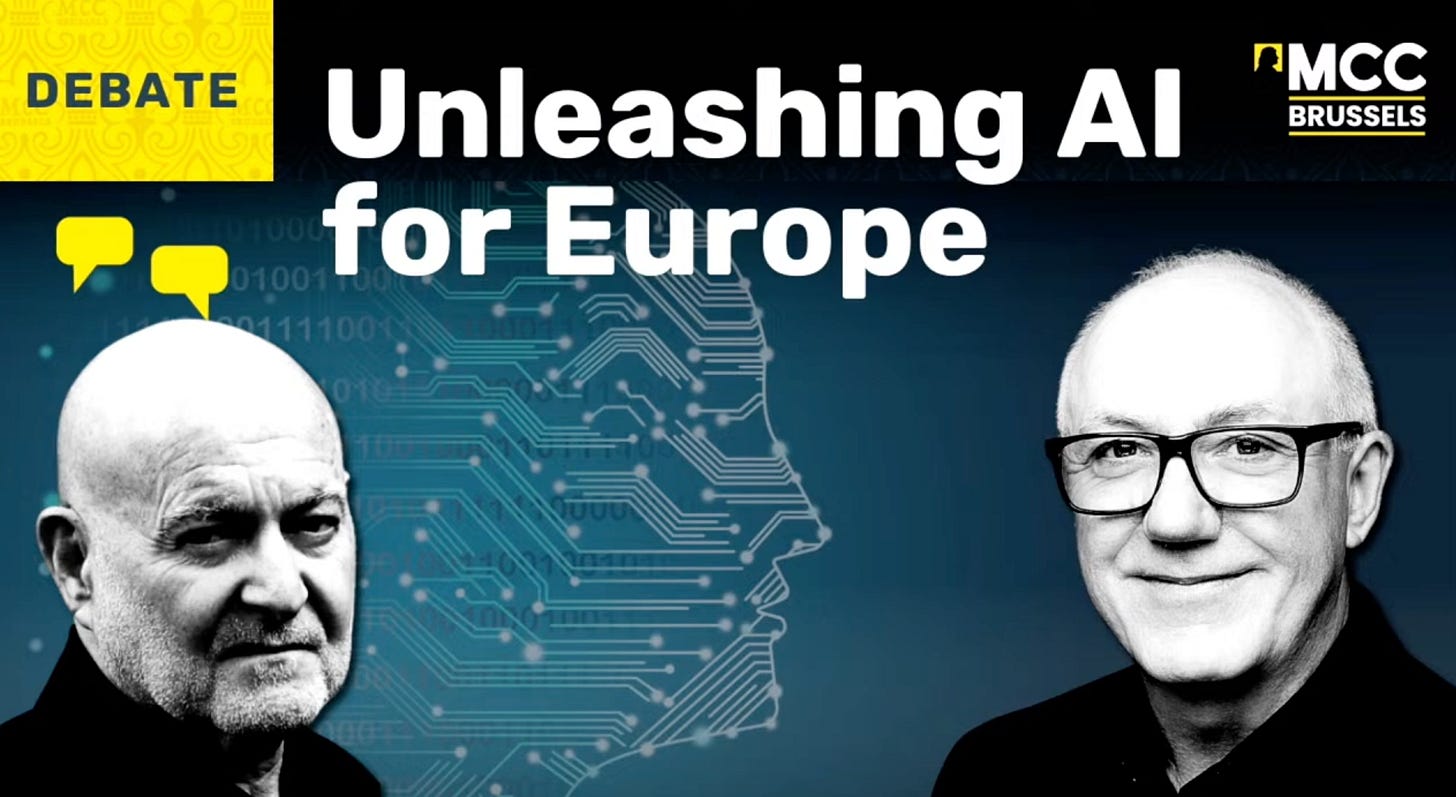A reminder for new readers. Each week, That Was The Week, includes a collection of selected readings on critical issues in tech, startups, and venture capital. I chose the articles based on their interest to me. The selections often include viewpoints I can't entirely agree with. I include them if they provoke me to think. The articles are snippets or varying sizes depending on the length of the original. Click on the headline, contents link, or the ‘More’ link at the bottom of each piece to go to the original. I express my point of view in the editorial and the weekly video below.
Editorial
I spent the week in London and Brussels. MCC Brussels invited me to give a keynote speech at their event: “Unshackling Europe’s Economy.” The entire event can be streamed here. So this week, a slightly different That Was The Week. Here is a short essay on innovation in Europe and the video of my session at the event.
My session was “Unleashing AI for Europe.” The audience, possibly like many readers here, was not a technology audience. The audience was interested in analyzing the EU’s limits and thinking about solutions.
My talk and the audience Q&A are embedded above as a Substack video.
The context for the talk was the glaring reality that AI development is very US-centric, albeit with many, or most, participants from other countries. Europe has only one significant developer of foundation models—Mistral from France. It has competitive features and a strong team, but due to coming later, it has far less developer adoption than OpenAI, Meta, Anthropic, and others.
However, the relative failure of the EU to produce AI leaders is a consequence of deeper problems. Mario Draghi, in his report on EU competitiveness, spells it out:
“Europe is stuck in a static industrial structure with few new companies rising up to disrupt existing industries or develop new growth engines. In fact, there is no EU company with a market capitalisation over EUR 100 billion that has been set up from scratch in the last fifty years, while all six US companies with a valuation above EUR 1 trillion have been created in this period. This lack of dynamism is self-fulfilling. Yet, Europe’s need for growth is rising.”
Draghi doesn’t have an analysis of why the EU is falling behind the US. And he does not have any realistic solutions.
My talk looked at what the problem is and how to solve it.
What is the problem?
When examining venture capital investment, the disparity between the EU and US becomes evident:
VC Funds Raised Per Capita: In 2023, the EU venture capital industry raised $31 per capita, whereas the USA and the UK raised $200 and $105 per capita, respectively.
Venture Investing Per Capita: The EU had company investments of $55 per capita in 2023, compared to $510 per capita in the USA and $320 per capita in the UK.
To match US levels of venture investment, Europe would need to mobilize approximately $230 billion annually into venture capital, which constitutes about 1.4% of its GDP. This significant gap underscores the urgent need for cultural shifts to enhance Europe’s competitiveness in the AI arena.
Why cultural shifts? About 60% of EU venture funding originates from the government, compared to 100% of US Venture funding from private sources. Most European private wealth targeting venture capital is invested in the USA rather than domestically.
Europe also buys predominantly US technologies from companies like Microsoft, Google, Amazon, Apple, Netflix, and others, producing a net exit of money from the EU to the US.
As European investments in US private equity demonstrate, lack of capital is not the problem. The crux of the problem is the lack of a good reason to invest in the EU.
There are many European venture managers focused on fixing this. Saul Klein and the team at Localglobe are discussed in the talk. After 21 years centered in London, Saul and others have created a situation where the UK per-capita deployment into the venture is approaching US levels. Niklas Zennstrom (Atomico), Reshma Sohoni (Seedcamp), and many others have created a risk-taking culture similar to Silicon Valley. They were undoubtedly helped by private capital.
The EU also has some significant funds doing the same: SpeedInvest, Cherry VC, Earlybird, Daniel Ek. The scale of the EU effort has yet to reach UK levels and certainly is far behind US levels.
In the UK, the British Business Bank and in the EU, the European Investment Bank, have helped channel funds to good investors, but neither is enough to bridge the gap to the USA.
Adding more Government money to the EU would not, on its own, help solve this cultural problem. Indeed, in my opinion, Government money tends to create top-down false ecosystems, fake VCs, and fake entrepreneurs dependent on state funds. These ecosystems usually lack the extreme risk-taking culture that bottoms up; privately funded venture capital does. $230 billion a year must be raised and deployed at US venture levels, and private capital must fund much of that. For that to happen, there must be more Saul Klein’s (as a generic type). Until that happens, many European startups will move to the US to take benefits from the US ecosystem.
Several notable European entrepreneurs have achieved success in the US:
Stripe: Founded by Patrick Collison and his brother, Stripe has become a leading fintech company in the US.
WhatsApp: Jan Koum, originally from Ukraine, co-founded WhatsApp, which Facebook later acquired.
PayPal: Max Levchin and Peter Thiel, of European origin, established PayPal as the cornerstone of online payments.
Trivago: German entrepreneur Ralph Schrömgens founded Trivago, which grew significantly in the US market.
c3.ai and Siebel Systems: Thomas Siebel, of German descent, led these influential AI and CRM companies.
Other Examples: Jan Bomhof (Dutch, PureGym), Sasha Poignonnec (French, Ticketmaster), Sebastian Siemiatkowski (Swedish, Klarna), Phillipe Kahn (Borland), Louis Monier (AltaVista), Sid Sijbrandij (Gitlab, Ukraine), and Daniel Dines (UIPath, Romanian) illustrate the trend of European talent exporting capital and innovation to the US.
Conditions for Success: Cultivating a Thriving AI Ecosystem
Several critical factors contribute to a thriving AI ecosystem:
Risk Culture: Embracing a culture that tolerates failure and encourages experimentation is essential. Innovation often involves taking risks, and a supportive environment can foster entrepreneurial initiatives.
Entrepreneurs, Not Just Academics: While academic research is vital, translating innovations into commercial ventures requires an entrepreneurial spirit and practical business acumen.
Risk Capital (Venture): Access to venture capital is crucial for scaling startups. Rather than public funding, private venture capital tends to drive high-risk, high-reward innovations.
Capital Markets: Robust stock exchanges with high liquidity enable companies to raise funds efficiently, supporting growth and expansion.
Regulatory Environment: A balanced regulatory framework that protects consumers and fosters innovation without being overly restrictive is necessary. Fear-driven regulations and criminalizing certain technologies can stifle progress.
This points to a challenging environment for those who want the EU to be where innovation is as successful as in the US.
What is Needed? Building a Resilient AI Ecosystem in Europe
To reverse the current trend and foster a thriving AI ecosystem, Europe must address several key areas:
Cultural Shift: Cultivating a culture that celebrates risk-taking, entrepreneurship, and innovation is foundational. Encouraging young talents to pursue startups and supporting them through failures can create a more dynamic environment.
Access to Capital: Increasing venture capital availability is critical. This can be achieved by incentivizing private investments, creating favorable conditions for venture funds, and ensuring that capital markets are accessible and liquid.
Authentic Entrepreneurship: Moving beyond superficial or “fake” entrepreneurship requires nurturing genuine innovators committed to long-term success. Successful examples of investors who do so include Saul Klein in the UK, Niklas Zennström (Sweden), Janus Friis (Denmark) with Skype, Daniel Ek in Sweden/Nordics with Spotify, and the founders of Revolut and Wise.
Success Stories: Inspirations from Europe
Europe has produced remarkable success stories that demonstrate the potential for AI and tech innovation:
Spotify: Founded by Daniel Ek and Martin Lorentzon in Sweden, Spotify revolutionized the music streaming industry.
Revolut and Wise: These fintech companies, founded by Europeans, have disrupted traditional banking and financial services.
Skype, Mistral, and Gitlab: Companies like Skype (Sweden/DENMARK), Mistral (€468m on €5.62bn pre-money valuation), and Gitlab (founded by Sid Sijbrandij from Ukraine) showcase the capacity for European startups to achieve global impact.
Europe’s Path Forward
Europe stands at a crossroads. To harness AI’s potential and ensure sustained economic growth, the EU must cultivate a supportive environment that encourages entrepreneurship, attracts and retains talent, and provides ample venture capital sourced from private investors.
By addressing cultural barriers, enhancing regulatory frameworks, and fostering innovation, Europe can overcome its challenges and emerge as a formidable player in the global AI landscape. Tenacity, strategic investment, and a clear end-game vision are essential to creating the context necessary for Europe to thrive in the Intelligence Age.
AI is not merely another technological advancement; it signifies a fundamental shift in how platforms operate and interact. Traditionally, platforms like the internet have enabled connectivity and information sharing. AI, however, enhances these platforms by introducing intelligent decision-making, predictive capabilities, and automation. This shift transforms platforms into dynamic systems capable of learning and adapting, increasing their utility and influence across various sectors. Recognizing AI as a platform shift for the EU is essential to fully leverage its potential and integrate it seamlessly into existing economic and social frameworks. The AI Act that will come into force in 2027 seems to point in the opposite direction: less risk and more regulation.
The Value of AI to Humanity
The value AI brings to humanity is immense and multifaceted. AI technologies can drive unprecedented efficiency, innovation, and problem-solving across numerous domains. In healthcare, AI can assist in early diagnosis and personalized treatment plans. In environmental management, it can optimize resource usage and monitor ecological changes. Economically, AI can spur growth by creating new industries and enhancing productivity. Socially, it has the potential to improve quality of life by automating mundane tasks, allowing humans to focus on more creative and meaningful endeavors.
Stages of AI Development
AI development can be understood in several stages:
Narrow AI: Current AI systems excel at specific tasks, such as image recognition, language translation, or playing chess. These systems operate within defined parameters and lack general understanding.
General AI: The next stage envisions AI with the ability to understand, learn, and apply knowledge across a wide range of tasks, much like a human. Achieving general AI remains a significant challenge, requiring breakthroughs in cognitive architectures and learning algorithms.
Superintelligence: This stage refers to AI that surpasses human intelligence in all aspects, including creativity, problem-solving, and emotional intelligence. As Sam Altman suggests, we may reach superintelligence in a relatively short timeframe, potentially within a few thousand days, though some experts argue it may take longer.
Superintelligence and Autonomous Agents
Superintelligence represents a paradigm shift with profound implications. Autonomous agents powered by superintelligent AI could operate independently, making complex decisions and solving problems beyond human capability.
Sam Altman’s "The Intelligence Age"
In his recent work, "The Intelligence Age", Sam Altman emphasizes the monumental impact AI could have on history. He states,
“This may turn out to be the most consequential fact about all of history so far. It is possible that we will have superintelligence in a few thousand days (!); it may take longer, but I’m confident we’ll get there.”
Altman attributes this rapid advancement to the success of deep learning:
“In three words: deep learning worked. In 15 words: deep learning worked, got predictably better with scale, and we dedicated increasing resources to it.”
The Geography of AI: US-Centric Dominance
The landscape of AI development is predominantly US-centric. American tech giants like Microsoft, Apple, Google, Amazon, and Facebook have established formidable positions, driving innovation and attracting substantial venture capital. This dominance is contrasted sharply with Europe’s struggles to foster similar levels of dynamism and growth in the AI sector.












